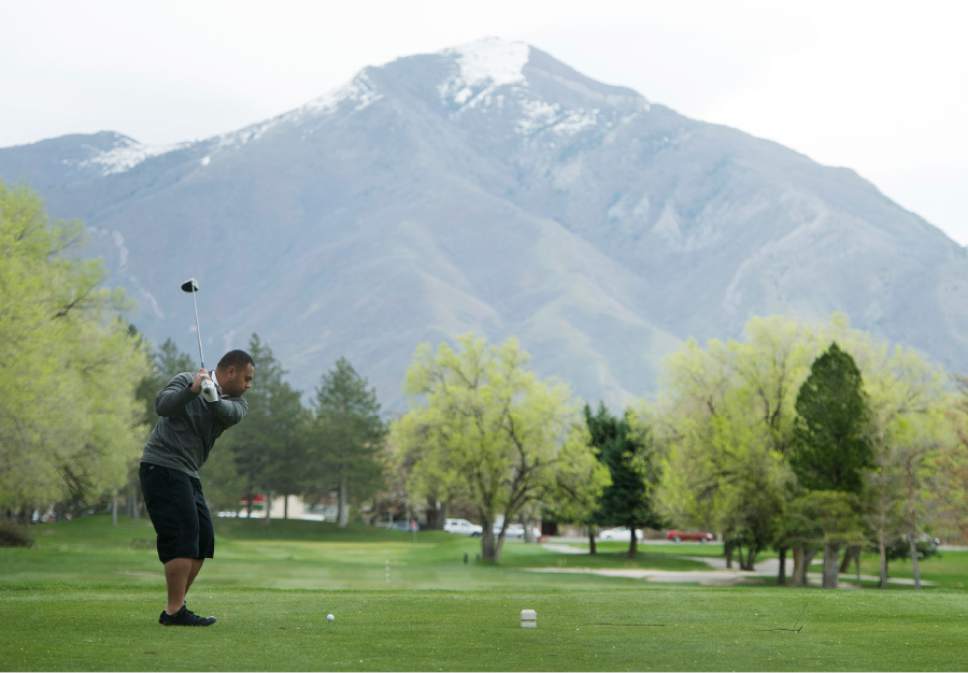This is an archived article that was published on sltrib.com in 2017, and information in the article may be outdated. It is provided only for personal research purposes and may not be reprinted.
With few alterations (see: golf), the Salt Lake City Council approved a $273 million budget proposal from Mayor Jackie Biskupski that includes water and sewer rate increases and a property tax hike for the city's libraries.
That the budget passed with little fuss owed to the council's willingness to table bigger-picture debates with the mayor's office (see again: golf), as well as a tidy solution to a $1 million shortfall that was discovered days before Tuesday night's unanimous vote.
"The budget process is hard no matter what, but at the end of the day, we got on the same page, and that is a win," Biskupski said of the process, which ended as state Sen. Jim Dabakis described relations between mayor and council as a "raging war" before the council rejected his nomination by Biskupski to the Utah Transit Authority board.
The city overcame the $1 million shortfall by budgeting a greater portion of its new growth in 2016-17 property taxes, a move regarded by the state as a tax increase even though Salt Lake City taxpayers will actually see their rates decrease in 2017-18.
State law judges tax increases on budgeted revenues, not actual revenues. So when Salt Lake City took in $4.5 million more in property taxes than it budgeted in 2016-17, that $4.5 million became onetime funds unless the city decided to view it as a tax hike for the 2017-18 budget.
Biskupski's budget already included $3 million of that $4.5 million — a so-called "stabilization" — and would have triggered a truth-in-taxation hearing anyway. The City Council on Tuesday opted to increase that stabilization amount to offset the remaining $1 million shortage.
A council staff report said the owner of a $250,000 property who paid $489 in 2016 would pay $8 less, given a $4 million stabilization.
"It keeps our taxing level still below the 2016 level, so the consumers, or the residents, aren't going to feel it," Biskupski said.
In the state's view, though, it's a $26 tax increase over the $463 the property owner would have paid if Salt Lake City had reduced its property tax rate so that it collected the same amount that it budgeted in 2016-17.
It's also possible that real-property owners will eventually have to pay the difference if last year's increases in personal property taxes — a more volatile category that includes hard-to-predict investments in machinery, computers, etc. — aren't sustained.
"What we did this year works really well in a growing economy. It does not work well in a level or declining economy," said Council Chairman Stan Penfold. "And so, this is not an option we have available all the time."
The complex issue required council staff to carefully explain segments of the plan to council members Tuesday.
Whether or not stabilization qualifies as a tax increase, the administration and council regard the budget as frill free and limited to the city's most basic needs.
A 30 percent increase in sewer rates, the first in a schedule of five years' worth of bumps, is required for a rebuild of the city's wastewater reclamation plant and other necessary sewer infrastructure upgrades.
A 5 percent increase in water rates was likewise said to be essential, and the $20 more annually that the owner of a $250,000 property would pay to city libraries would largely be spent on upgrades to older branches.
Although City Council members expressed frustration that Biskupski's budget didn't include more money for streets — two-thirds of which were most recently estimated by city engineers to be in poor condition — they favor bonding for a long-term solution and declined to try to carve more infrastructure funds from this year's lean budget.
"That's a big, $25 [million]- to $35 million-a-year issue, depending on what numbers you look at," Penfold said. "We didn't even talk about that, so that's a big looming [issue]."
The biggest clamor to arise was brought about by the mayor's vision for the future of Rose Park Golf Course, though the debate was fairly subdued compared to previous discussions of city golf courses that have failed to break even.
The council rejected Biskupski's proposal to fold the Rose Park course into the city's general fund, where unanticipated deficit levels would need to be offset by funding allotted for the city's streets and public safety, among other things.
It granted the $400,000 subsidy the mayor called for to sustain Rose Park's course, but it kept Rose Park in the city's golf enterprise fund.
The council added a contingency that to receive funding for operations at six city-owned courses, the city has to issue a request for proposal for course operators.
"I hear from golf lovers in this city all the time that there are good ideas out there that would keep golf courses open and afloat, and we need to hear them," said Councilwoman Erin Mendenhall.
Other expected big-ticket budget items like the Twilight Concert Series will be reviewed later.
The approved budget includes no funding for Twilight, and the Arts Council has been directed to develop a plan for its long-term viability that it will present to the administration and the council for consideration.
Twitter: @matthew_piper



